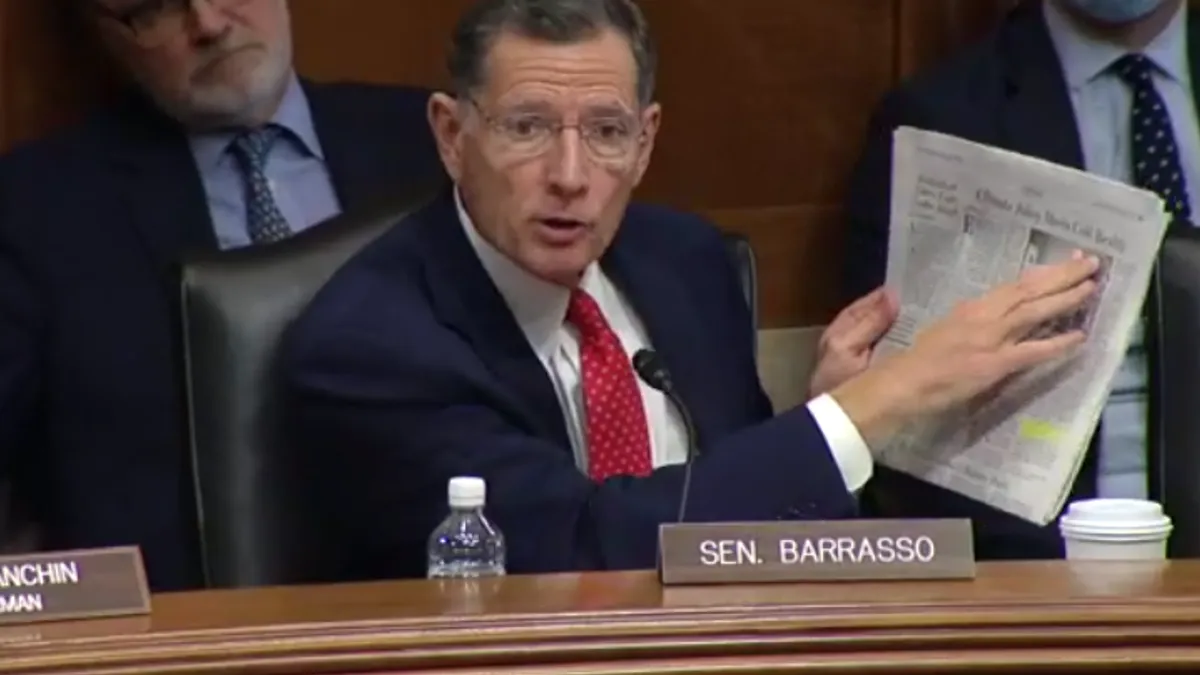Dive Brief:
- U.S. Senators on Tuesday questioned members of the Federal Energy Regulatory Commission on a wide range of policy and legislative issues — including electric transmission, gas infrastructure and energy market design — with Republicans often using their platform to cast doubt on Democrats' clean energy and decarbonization plans being considered by Congress.
- The House's proposed Clean Electricity Performance Program (CEPP), which would incentivize utilities to deliver more renewable energy, is an "H-bomb" that would "effectively end the markets," FERC Commissioner James Danly said.
- "Not one Republican is going to support that bill," said Sen. John Barrasso, R-Wyo, the ranking member on the Senate Committee on Energy and Natural Resources.
Dive Insight:
Tuesday's Senate hearing was ostensibly convened to review the administration of laws "within FERC's jurisdiction," but much of the discussion focused on issues outside commission purview. With Republican Senators teeing up questions regarding Democratic legislative proposals, two commissioners voiced their concerns.
The five-seat commission is currently split evenly between Democrats and Republicans, and President Joe Biden has nominated Willie Phillips Jr., chairman of the District of Columbia Public Service Commission, to fill the vacant seat.
Barrasso directed his questions about the CEPP only to Danly and Commissioner Mark Christie, the commission's Republican members.
Higher power prices would be an "almost inevitable" outcome of the CEPP, said Danly, who prefaced his response to a question from Barrasso by saying, "I typically don't think its my role to comment on legislation before Congress." He went on to say, however, that organized markets have been developed over decades and the CEPP would "absolutely change and frustrate every settled expectation we have for these slowly developed and incrementally produced markets."
The $150 billion CEPP would require electric providers to increase the amount of clean energy distributed to customers by 4% year over year. Providers that meet the goal would get grants from the Department of Energy, while those falling short would owe money.
Different states would be impacted differently, depending on their generation mix, said Commissioner Christie. "For states that are heavy on dispatchable resources, like gas, coal and nuclear, it could potentially have a very heavy impact, certainly on cost."
The hearing did touch on topics within FERC's jurisdiction. Sen. Martin Heinrich, D-N.M., asked about the need for transmission reform, focusing in particular on whether FERC has the necessary tools to allocate costs equitably and how interconnection queue delays can be addressed.
Transmission queue delays "are far too long and they're obviously causing issues," FERC Chairman Richard Glick said. "We need to marry up our transmission planning process with the interconnection queue process. Right now they're disjointed."
FERC in July launched an advance notice of proposed rulemaking, inviting comment on improvements to current transmission planning and cost allocation processes, as well as the generator interconnection processes.
"We need to look at the way network upgrade costs are allocated," said Glick. "Sometimes we look at benefits way too narrowly." The commission should be considering grid reliability, congestion mitigation and access to cheaper energy, he said, along with direct financial benefits.
Traditionally, FERC has supported a situation in which the generator connecting to the grid has to pay the upgrade costs despite a significant number of beneficiaries, said Glick. "It's causing generators in the interconnection queue to drop out at the last minute."
Senators also focused on gas infrastructure. Committee Chairman Joe Manchin, D-W.Va., in his opening statement said natural gas "has an important role in the energy transition" and "we need to smartly expand the country’s natural gas infrastructure system."
How the commission will approach the siting of natural gas projects was a specific topic of concern, in particular following a June federal court of appeals decision vacating FERC's certificate of an existing pipeline. There, the court concluded FERC did not sufficiently assess the need for the Spire STL pipeline in its 2018 approval. There are also questions of whether more projects will require a lengthy Environmental Impact Statement in order to assess their climate impacts, or whether a shorter Environmental Assessment (EA) will suffice.
"We'll still go forward with some EAs," Glick said, "but if there is any question regarding the significance of greenhouse gas emissions the law requires us to do an environmental impact statement instead of an EA."
Glick said the commission would likely set a "particular standard" for the expected level of emissions below which projects can go forward with an EA. FERC is also waiting for guidance from the White House Council on Environmental Quality on how it should handle the social cost of carbon in terms of assessing greenhouse gas emissions. The commission is independent but "has historically tried to follow CEQ guidance," Glick said.
CORRECTION: A previous version of the story misquoted Commissioner Danly. He said the CEPP would "change and frustrate every settled expectation we have for these slowly developed and incrementally produced markets."















